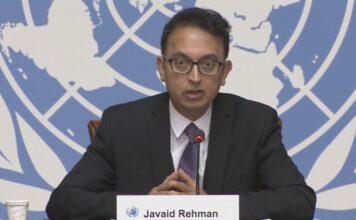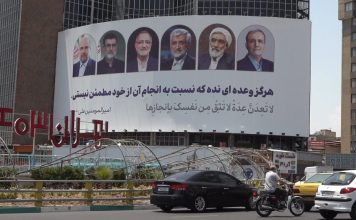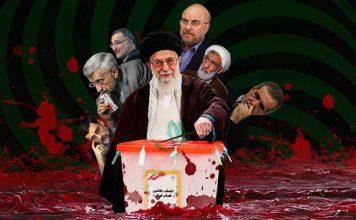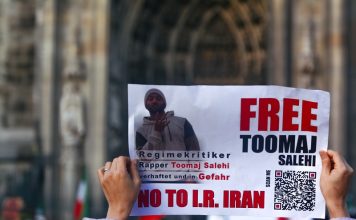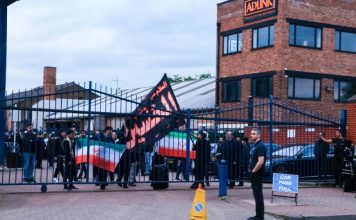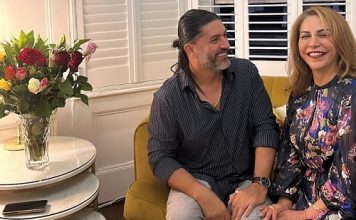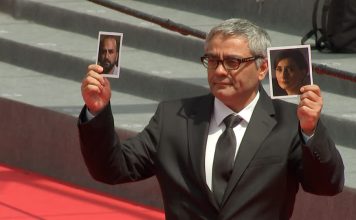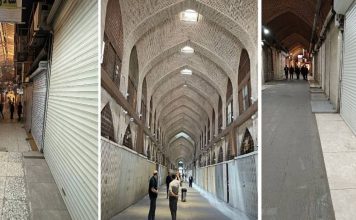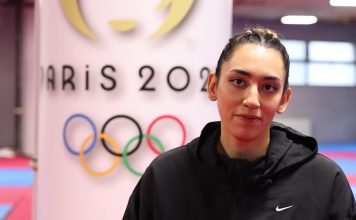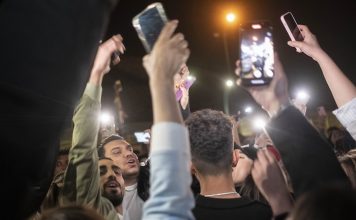Fariba Balouch, an advocate for the rights of women and of the citizens of Balouchistan in Iran is among the 13 winners of the International Women of Courage award granted annually by the US State Department.
The State Department identified Balouch as being from Iran’s Sistan and Balouchistan Province and a member of Iran’s marginalized Balouchi ethnic group. It said the award honors “women from around the world who have demonstrated exceptional courage, strength, and leadership in order to bring about positive change to their communities, often at great personal risk and sacrifice.”
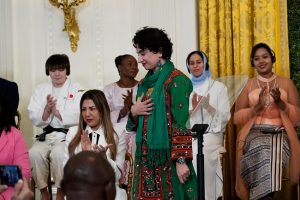
Balouch “is outspoken about women’s rights and the human rights crisis in Sistan and Balouchistan, which has been disproportionately affected by regime violence, executions, and systemic discrimination. As a result of her activism and in an effort to intimidate her, Iranian authorities have threatened her life and detained her son and brother in Iran,” the State Department said.
Balouch, who left Iran two years ago, received her award in a ceremony on March 13 at the White House in the presence of Jill Biden, the First Lady of the United States, and Secretary of State Anthony Blinken.
Kayhan Life spoke to Ms. Balouch at Winfield House, the residence of the United States Ambassador to the United Kingdom, Jane Hartley. Balouch discussed the arrest of her son and brother in June by the security forces of the Islamic Republic, the status of women, the importance of unity and solidarity, and her hope that Iran will in the future be freed of the Islamic Republic.
Ms. Balouch, I am grateful that you accepted our interview invitation, and I wish you a happy Nowruz. How do you feel about this Nowruz and receiving the award?
My greetings to you and your listeners, and I wish a happy Nowruz to all my compatriots worldwide. I want joy and happiness for my fellow Iranians and hope they are rescued from oppression and experience freedom, equality, and justice this year.
Nowruz brings joy to all Iranians and marks the start of the spring. However, because of the events of the past two years, Nowruz has been marred with sadness and the tragic loss of loved ones.
The International Women of Courage [IWOC] award, given at the start of Nowruz, brought a feeling of sadness because of the women who are in prison and others who keep the struggle alive in the streets. The award belongs to those women, not to one person.
They continue the fight in the prisons and on the streets. Also, Balouch women begin their battle at home. I wish they were the recipients of the award. I am delighted that the world hears the voices of Iranian women and sees their resistance and struggle.
The world has heard the voices of the Balouch and of Balouch women of Iran for the first time. I am pleased about that. I have heard from friends and other women who are encouraged by this. This also motivates me and others to remain steadfast in our struggle.
Families get together during Nowruz. What is the latest news of your son and brother, who were arrested after returning to Iran?
That is correct. This Nowruz is mixed with extraordinary sadness for me and others. My brother was already in Iran. It was my son who returned to Iran. People like my brother and son, who have experienced imprisonment in the Islamic Republic, will never be the same as they were before their incarceration.
Imprisonment changes a person and impacts their entire family and many other families. Unfortunately, my son was handed a one-year prison sentence. He served two months and was given a two-year travel ban. He suffered psychological trauma. My brother cannot get a job. His life has been shattered.
Some people criticized me after my son went to prison, asking how I could love other people’s children and fight for them when I did not care for mine. However, I believe that I fought for other people’s children because I love my son, so other parents do not experience the pain that I have felt.
I think about all mothers. I was fortunate this Nowruz to call my son and hear his voice. However, some mothers, including Gohar Eshghi and hundreds of others, sat beside their children’s pictures and cried.
Many sat beside their children’s graves and cried. They will never hear their children’s voices again. This is painful for a mother. I am fortunate because I can listen to my son’s voice.
People may believe a courageous person feels no fear, but the opposite is true. Courage is not a lack of fear, but the opposite. As a mother, I am scared. All mothers living in Iran love their children and fear for them.
Courage is remaining resolved and moving forward despite those fears. Change occurs once that happens. It is excruciating, but there is no other solution.
You have spoken of pain and suffering. You have referred to the revolution — Mahsa [Zhina Amini], and the ‘Woman, life, Freedom’ movement, which began in Iran — as the revolution of Iranians who are treated as “outsiders” in their homeland. Do you still feel like an outsider, given the slogans chanted in the past year, including “from Kurdistan to Balouchistan, I give my life to Iran”?
It is an interesting question. We felt this way for years. I mainly felt that way because of the pain of experiencing discrimination because of being an ethnic [Balouch].
All people in Iran are oppressed by the Islamic Republic, including women who are [treated] as second-class citizens. It is painful to be an Iranian citizen, but the pain of being a woman and an ethnic Balouch, Turk, Kurd, or Arab is markedly different.
You live with that pain. No one can know [that pain] until they live with it. The authorities in Tehran transferred [Mahsa] Zhina [Amini] from the detention center to the hospital. Her brother was crying, saying, ‘We are strangers here,’ which I found heart-wrenching.
The pain that had been bottled up for years came out. I have worn my ethnic Balouch attire wherever I have appeared in the past year. I do not blame the public. The Islamic Republic has tried to create divisions among people systematically.
The Islamic Republic knows that the public becomes stronger if all groups unite and join forces. By using stereotypical labeling, the state has tried to create a negative image of ethnic Balouchis, Kurds, and Arabs, something that I have experienced.
Many people could not place us when we traveled. They looked at our clothes and asked if we were Indian or Arab. I experienced that during my childhood and youth. It was excruciating. I was always relieved to return to our hometown in Balouchistan.
We always felt like “outsiders” and missed home. However, in the past year, when I attended meetings or delivered speeches, many people approached me and hugged me, saying they did not know what I and others felt and experienced, which was heartwarming.
Despite years of despair and distrust, I am hopeful that after the liberation of Iran, we will experience justice and equality. Freedom without equality is meaningless. Then a fellow Tehran, Shiraz, or Isfahan citizen cannot tell me they knew nothing [of our plight.]
Unfortunately, we currently do not have independent media in Balouchistan. We have had access to media outlets outside Iran in the past year, but the situation in Iran will be different.
I hope no one will be treated as a second-class citizen and be oppressed because of their ethnicity, religious beliefs, and language. Hopefully, the future government will treat everyone equally.
You mentioned that you worked in Iran and Balouchistan as a teacher and welfare worker and for a women’s charity. You established a charity to help people with addiction. There are reportedly dozens of Balouchi women serving on rural and city councils. What conditions and restrictions do these ladies work under?
I was a teacher for 16 years in a society where people experience restrictions because of their religious beliefs and or ethnicity. When I am asked about my experience, I recall the pain.
As Balouchis, we had limited resources as students and teachers. For many students, not having access to education because of poverty and lack of schools was a painful experience.
Several women have become council members in the past few years. Using myself as an example, many ask where Fariba Balouch came from and how she got to where she is today.
Many people do not know how hard a person worked and fought many battles to get to where they are now. Besides being a teacher, I was also a member of the women’s commission and the head of the social and cultural department in the municipal office.
During seminars on the social issues affecting women and children and while teaching students, I witnessed other people’s agony, caused by poverty and discrimination. That is how I became interested in women’s welfare. I wanted to do something different for women who were single mothers. I endured extreme difficulties when I tried to open a center for women’s welfare. Some men put men in charge of such centers.
Opening the first women’s welfare center in the south of the province was challenging. It coincided with the presidential elections, which were a month before. They gave me a derelict building, saying I had one month to open the center because it had to be inaugurated before the elections.
I knew I had to get my degree in psychology, so after 13 years, I enrolled in a university again. I suffered a lot during that month. The building had no electricity or plumbing. Those women studied hard under challenging conditions. I know that women who serve in rural councils completed their educations with incredible difficulty.
Unfortunately, under the Islamic Republic, even men do not have many government and administrative opportunities, let alone women. They cannot become governors and judges because they are Balouch or Sunni. The Islamic Republic practices religious and gender apartheid.
In interviews, you have recalled the first time you received a marriage proposal through your grandfather. He who had agreed to the wedding before you even knew about it, turned to you and said, ‘This is a spit that I cannot pick up from the ground,’ which must have been very painful to hear. The incident reveals that a traditional culture exists. Molana Abdolhamid [Esmaeilzadeh, spiritual leader of Iranian Sunnis] has been among the leaders of the pro-democracy movement in Iran. How do you see the role of religion in this movement?
If I may, I would like to answer the question about culture. I recommend that people read the history of Balouchistan whenever I speak about the historical role of Balouch women and their status in modern society.
Unfortunately, Balouch culture suffered during the rule of the Islamic Republic, which deliberately deprived the [population] of education. This measure was aimed at preventing social awareness. Being aware of one’s rights leads to demanding those rights.
Unfortunately, this happened under the Islamic Republic. No one in Balouchistan wore a black veil known as ‘Khomeini chador.’ Unfortunately, our culture was invaded by many outside influences.
Fortunately, the development of social media has enabled young people to educate the public, causing rapid change, the results of which can be seen among girls and women.
It has also impacted men. You mentioned Molana Abdolhamid, a religious leader who previously urged people to remain silent. Yet he sided with the people after ‘Bloody Friday’ [on Sept. 30, 2022, when security forces opened fire on peaceful protesters in Zahedan, the capital of Sistan and Balouchistan.]
The public’s trust and respect for Molana Abdolhamid grew. Many things changed after the Mahsa Zhina Amini movement and Zahedan’s Bloody Friday. I do not think people will go back from that.
We started this interview with Nowruz and will finish it with Nowruz. You have said that no one should lose hope. How do you see the future?
For me, the future is fused with struggle. There will be days when we feel tired, sad, and hopeless. Yet I have never allowed these feelings to stop me, believing that change is only possible through action.
I am hopeful about a future filled with resistance, fight, and hope. The path of struggle is challenging, but the most important thing is not to lose hope, to overcome our fears, and to start with small steps.
We know we cannot change the world, but we also know we have done well if our actions affect even just one person or save just one individual.

